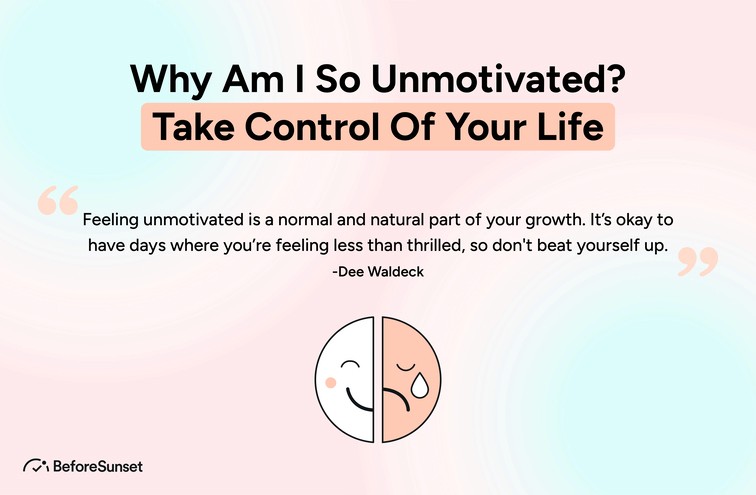A typical experience that may leave us feeling trapped, irritated, and dissatisfied is feeling uninspired. Lack of motivation may have a big influence on both our personal and professional life, whether it manifests as delaying on duties, missing excitement for our objectives, or feeling lost.
But do not worry; you can take back control of your life. In this blog, we'll look at the root reasons of lack of motivation, examine workable solutions, and give you the tools you need to regain control over your life.
You may rekindle your passion, rekindle your inner drive, and build the path to a more satisfying and purposeful living by comprehending the cause of your demotivation and employing practical solutions.
Together, let's take this journey to learn how you may reawaken your drive and take advantage of the chances that lie ahead on the road to success and personal development.

What Is Motivation Exactly?
The internal drive and process that originates, directs, and maintains action towards reaching a goal or satisfying a need is referred to as motivation, which is a complicated psychological term. It is the driving force behind people's decisions, actions, and perseverance in pursuit of their desired results.
Important components of motivation include:
Activation: Motivation is activated when an activity is first started. It serves as the impetus for beginning a specific job or goal.
Persistence: When faced with difficulties or barriers, motivation enables you to keep your attention and effort up over time.
Intensity: Motivation levels can differ, with certain jobs or objectives inspiring more drive than others.
Direction: Motivation also offers a feeling of direction, pointing people in the direction of certain activities that support their goals.
Both internal and external influences have the potential to affect motivation. It may be internally motivated by needs, wants, interests, values, and beliefs. External influences that influence behavior include incentives, acknowledgement, social acceptance, or repercussions.
Extrinsic and intrinsic motivation are two examples of different types of motivation.
Intrinsic motivation: A person's internal drive is what drives them. It results from within rewards like pleasure, curiosity, or a sense of achievement. People who are genuinely driven find fulfillment in the activity at hand and participate in activities because they do so for intrinsic reasons.
Extrinsic motivation: Extrinsic motivation, on the other hand, is derived from outside sources. It entails acting in a certain way in order to obtain attention from others, escape punishment, or receive benefits from the outside world. While receiving external rewards can increase motivation at first, they may not be as successful in sustaining long-term commitment and zeal.
Being a dynamic process, motivation may change over time as a result of varying circumstances, feelings, and experiences. Knowing what motivates people may help people create worthwhile objectives, get through setbacks, and maintain their will to fulfill their ambitions.
Understanding Unmotivation
Understanding unmotivation entails identifying the psychological condition defined by a lack of drive or zeal to participate in activities, pursue objectives, or carry out obligations. Unmotivation can be caused by a variety of internal issues, including unfavorable feelings, self-doubt, a lack of clarity, or a sense of overload.
This condition may also be influenced by outside variables including inadequate support, intense pressure, or inadequate incentives. People might learn more about their own behavior and situation by pinpointing the exact causes of their lack of drive.
This knowledge serves as the basis for putting specific motivational techniques into practice, such as defining clear goals, getting help, controlling stress, creating a good atmosphere, and treating any underlying emotional or physical difficulties.
Individuals may tackle unmotivation with self-compassion and perseverance while working to rekindle their love and excitement for life's goals by acknowledging that it is a common human experience.
The Science Behind Unmotivation
A complex interaction of neurological, psychological, and environmental elements that can affect a person's motivation levels is at the heart of the study of unmotivation. To comprehend the basic mechanics of motivation and the causes of uninspired behaviors, researchers have carried out various investigations. The following are some significant elements of the unmotivation science:
Neurotransmitters and Brain Circuits: The brain's reward system, which involves the production of neurotransmitters like dopamine, is strongly linked to motivation. Dopamine is released when we feel pleasure or accomplish a goal, reinforcing the action and inspiring us to repeat it. Decreased drive and motivation, however, can result from neurotransmitter imbalances or disturbances in the brain circuits responsible for motivation.
Hormonal Influence: Hormones like serotonin, which controls mood, and cortisol, the stress hormone, can affect motivation levels. Chronic stress can cause motivation to decline, and serotonin imbalances may play a role in feelings of apathy and low drive.
Psychological Factors: Motivation is greatly influenced by psychological factors like self-efficacy (confidence in one's talents), locus of control (sense of control over one's life), and goal-setting. Unmotivated conduct may result from low self-esteem or a lack of confidence in one's talents.
Extrinsic and Intrinsic Motivation: It's important to comprehend how these two types of motivation interact. Extrinsic motivation is influenced by external incentives, recognition, or punishment, but intrinsic motivation is driven by internal qualities like curiosity, enjoyment, and a sense of mastery. Long-term decreases in intrinsic motivation might result from a dependence on external incentives too much.
Psychological Needs: According to the self-determination theory, three fundamental psychological needs—autonomy (a sense of control), competence (a sense of ability), and relatedness (a sense of community)—have an impact on motivation. Reduced motivation may result from these requirements not being met.
Cognitive Processes: Cognitive elements that might affect motivation include cognitive dissonance (conflicting ideas), cognitive load (the amount of mental work necessary to complete a task), and cognitive appraisal (the way a situation is seen).
Environmental and Social Influences: The environment and society have a significant impact on motivation. Negative or unsupportive surroundings can demotivate people, whilst supportive and good environments can increase motivation.

Am I Lazy or Burnt Out?
It might be difficult to tell the difference between being lazy and being burnt out because they can be related in certain ways. They have unique traits and come from several underlying causes, though. Let's examine the distinctions between being lazy and being burned out:
Feeling Lazy:
When someone says they are feeling lazy, they usually mean that they lack motivation or are hesitant to carry out chores, obligations, or other activities. Temporary causes like boredom, lack of interest, or a desire to avoid work or discomfort can all contribute to laziness.
It's crucial to understand that occasionally experiencing emotions of lethargy is common and can sometimes be a natural reaction to relaxation or quiet. However, if you routinely put off obligations or chores without any apparent justification, it may be worthwhile to assess your levels of motivation and pinpoint any possible demotivating factors.
Experiencing Burnout:
Burnout, on the other hand, is a condition of emotional, mental, and physical weariness brought on by extended stress or an abundance of expectations. People often experience it when they are emotionally spent, run down, and disconnected from their work or hobbies.
Burnout frequently results from ongoing stress that is left unresolved, feeling overburdened, or having to deal with overwhelming tasks or commitments. It may result in a major drop in motivation and show up as a loss of enthusiasm in tasks, poor performance, or cynicism about them.
Making a Difference Between the Two:
Consider the following to distinguish between being lazy and being burnt out:
Laziness is typically fleeting and may disappear after taking a break or partaking in enjoyable activities. On the other hand, burnout is more enduring and has a propensity to get worse with time.
Temporary indifference or a desire for relaxation can both contribute to laziness. Burnout is frequently a reaction to ongoing stress and too many obligations.
Laziness may not necessarily show any obvious physical or emotional signs. On the other side, burnout is linked to signs including physical tiredness, emotional depletion, and a loss of interest in once-enjoyable activities.
Laziness may not have a big influence on your capacity to do daily duties. Your job, relationships, and general functioning can all be negatively impacted by burnout.
Your lack of motivation may be more indicative of sporadic laziness if you discover that it is largely tied to certain chores or times of downtime.
Burnout, however, could be present if you frequently feel overburdened, emotionally spent, and unable to handle your obligations or work. It's critical to manage burnout if you suspect it by getting help, scheduling time for self-care, and making adjustments to lessen workload and stress.
If it's difficult for you to control these emotions on your own, think about asking a mental health professional for advice and help.
What Burnout Really Looks Like?
Chronic emotional, mental, and physical weariness called burnout is a condition brought on by ongoing stress. It can lead to a deterioration in job or academic performance through continuous weariness, mental anguish, and low motivation.
Burnout may cause a person to withdraw from obligations, alienate themselves from others, and adopt a pessimistic and cynical attitude toward life and work. They may have cognitive deficits, such as memory loss and difficulties concentrating, and may struggle to find purpose or satisfaction in things that formerly brought them fulfillment.
There may also be physical symptoms including muscular tension, headaches, and sleep problems. Beyond regular stress, burnout has a major negative influence on everyday functioning, relationships, and general well-being.
Understanding the symptoms of burnout is essential to adopting proactive measures to alleviate it and giving self-care and stress management techniques first priority. The rehabilitation process and the avoidance of burnout can both benefit from asking friends, family, or experts for assistance.
How Rare is Burnout?
Burnout affects people in a wide range of occupations, markets, and life situations, therefore it is not as uncommon as one might believe. Research studies and surveys indicated that burnout was growing more common, especially in high-stress workplaces and helping professions like healthcare, education, and social work.
According to a global Gallup study, 23% of workers reported feeling frequently or always burned out at work. It's important to keep in mind, though, that burnout is not only a problem for workers; it may also impact caregivers, students, and those who are under a lot of stress in their personal lives.
As burnout has become more well recognized, more individuals are looking for assistance and support to manage and avoid it. Better outcomes and enhanced wellbeing can result from identifying the warning symptoms of burnout and taking proactive measures to manage it.

Possible Causes of A Lack of Motivation
Numerous internal and environmental factors might contribute to a lack of desire. Typical examples of potential reasons are:
Lack of Clearly Defined Goals: A lack of direction and motivation might result from a lack of clearly defined, specified, and reachable goals.
Feeling Overwhelmed: Taking on too many obligations or duties may be taxing, and it can be hard to find drive.
Lack of Interest: Participating in tasks or activities that do not reflect your interests or beliefs might make you feel unmotivated.
Fear of Failure: Feelings of failure or the dread of falling short of goals can sap drive.
Negative Mentality: Self-doubt or persistently negative thinking can sap motivation.
Lack of Reward or Recognition: Lack of recognition or compensation for your work might make you less enthusiastic.
External Stressors: Personal concerns, family troubles, or relationship difficulties may have an influence on motivation.
Monotony: Doing the same thing over and over again without diversity might make you bored and less motivated.
Health Issues: Physical or mental health issues can have a substantial impact on motivation and energy levels.
Lack of Support: Being alone or lacking a support system might make it difficult to stay motivated.
Burnout: Long-term stress and tiredness can cause burnout, which can result in a loss of drive.
Environmental Factors: A chaotic or unwelcoming atmosphere may have an effect on motivation.
Sleep Deprivation: Lack of sleep can have a negative impact on motivation, energy, and mood.
Unhealthy Lifestyle Habits: Motivation can be impacted by poor food, inactivity, and substance misuse.
Negative Past Experiences: Negative past events might have an impact on a person's drive and self-confidence.
How to Boost Motivation
Rekindling your desire and passion for pursuing your objectives and activities requires a combination of internal and external tactics for increasing motivation. Start by establishing specific, doable goals, breaking them down into smaller steps, and acknowledging your accomplishments as you go.
Practice self-compassion and positive affirmations to foster a good outlook. Find things to do that you truly enjoy and that are consistent with your values to increase your intrinsic drive. By surrounding yourself with motivating people and seeking out help from friends or mentors, you may create a supportive atmosphere for yourself.
Maintain your physical and mental health by engaging in regular exercise, eating a balanced diet, and getting enough sleep. To avoid monotony and boredom, add variation and originality to your daily activities.
Take into account time-management strategies like the Pomodoro Technique to keep your attention and productivity. Recognize and praise yourself for your successes, no matter how minor, to encourage good behavior.
Keep in mind that motivation may change, and it's OK to ask for help from others or take pauses when necessary.
Stay Motivated With BeforeSunset
Make the most of each day before the sun sets. Embrace the idea that every day is an opportunity to pursue your goals, dreams, and passions. Set specific and meaningful objectives for yourself, and break them down into actionable steps. BeforeSunset helps you bring clarity to your workday.


